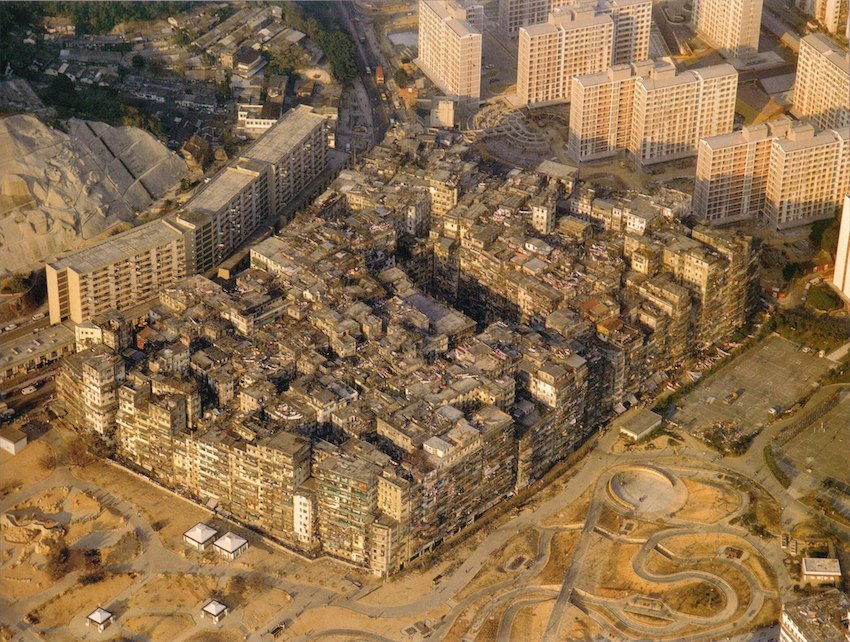Designing Dystopia

An aerial photo of the Kowloon Walled City
taken in 1989. The new park which was laid out at the site of the
former Sai Tau Tsuen squatter settlement is visible at the south edge
of the city.
デストピアを設計する
Designing Dystopia

An aerial photo of the Kowloon Walled City
taken in 1989. The new park which was laid out at the site of the
former Sai Tau Tsuen squatter settlement is visible at the south edge
of the city.
さあ、これからディストピアを設計しよう!!! ディストピアとは、ジョージ・オーウェルの『1984 (Nineteen Eighty-Four)』(1948)、オルダス・ハクスリーの『すばらしき新世界 (Brave New World)』(1932)、レイ・ブラッドベリの『華氏451』(1953)などのディストピア小説というジャンルに代表されるように、おもに作家の頭 の中で設計されてきました。
| 授業担当者:池田光穂(Mitsuho
Ikeda) |
【仮想シラバスです現実の授業ではありません】 |
| 履修対象/Eligibility |
|
| 開講時期/Schedule |
|
| 講義室/Room |
|
| 講義題目/Course Name |
|
| 授業の目的と概要/Course
Objective |
|
| 学習目標/Learning Goals |
1)日本語になった「ディストピア」を、そのカタカナ用語を知らないひとに概説することができる。 2)授業中で紹介された「ディストピア小説」作品をすくなくとも最低2冊を読み、そのディストピアの社会の特徴や誕生(仮想社会の歴史的経緯)について「解剖的に分析」することができる。 3)用語解説にあるように、ディストピアの要素の裏返しなので、ディストピアの設計(デザイン)は、ユートピアの設計に転用できる「社会的意義」について理解できること。 |
| 履修条件・受講条件
/Requirement; Prerequisite |
|
| 特記事項/Special Note |
|
| 授業計画/Special
Plan (回)題目/Title:内容/Content |
|
| 授業形態/Type of Class: |
|
| 授業外における学習
/Independent Study Outside of Class |
|
| 教科書・教材/Textbooks |
|
| 参考文献/Reference |
|
| 成績評価/Grading Policy |
|
| コメント/Other Remarks |
|
| キーワード/Keywords |
|
| 受講生へのメッセージ/Messages
to Prospective Students |
【用語解説】
"A dystopia* is a fictional community or society that is undesirable or frightening. It is often treated as an antonym of utopia, a term that was coined by Sir Thomas More and figures as the title of his best known work, published in 1516, which created a blueprint for an ideal society with minimal crime, violence and poverty. The relationship between utopia and dystopia is more complex than this, however, as utopian elements are found in many dystopias, and vice versa.-* (from Ancient Greek δυσ- "bad, hard" and τόπος "place"; alternatively cacotopia or simply anti-utopia)" - dystopia .
"Dystopias are often characterized by rampant fear or distress, tyrannical governments, environmental disaster, or other characteristics associated with a cataclysmic decline in society. Despite certain overlaps, dystopian fiction is distinct from post-apocalyptic fiction, and an undesirable society is not necessarily dystopian. Dystopian societies appear in many fictional works and artistic representations, particularly in stories set in the future. The best known by far is George Orwell's Nineteen Eighty-Four (1948). Other famous examples are Aldous Huxley's Brave New World (1932), and Ray Bradbury's Fahrenheit 451 (1953). Dystopian societies appear in many sub-genres of fiction and are often used to draw attention to society, environment, politics, economics, religion, psychology, ethics, science, or technology. Some authors use the term to refer to existing societies, many of which are, or have been, totalitarian states or societies in an advanced state of collapse. Dystopias, through an exaggerated worst-case scenario, often make a criticism about a current trend, societal norm, or political system."- dystopia .
「ディストピアとは、恐怖や苦悩が蔓延し、専制的な 政府や環境破壊など、社会が激変することを特徴とするものが多い。ディストピア小説は、ある種の重複はあるものの、終末論的な小説とは異なるものであり、 望ましくない社会が必ずしもディストピアであるとは限らない。ディストピア社会は、特に未来を舞台にした物語において、多くのフィクション作品や芸術表現 に登場する。最もよく知られているのは、ジョージ・オーウェルの『1984 (Nineteen Eighty-Four)』(1948年)であろう。また、オルダス・ハクスリーの『すばらしき新世界 (Brave New World)』(1932年)やレイ・ブラッドベリの『華氏451』(1953年)なども有名である。ディストピア社会は、フィクションの多くのサブジャ ンルに登場し、社会、環境、政治、経済、宗教、心理、倫理、科学、技術などに注意を喚起するために用いられることが多い。作家によっては、既存の社会を指 してこの言葉を使うこともあるが、その多くは全体主義国家や崩壊の進んだ社会である。ディストピアは、誇張された最悪のシナリオを通して、現在の傾向、社 会的規範、政治体制などを批判することが多い」(by www.DeepL.com/Translator)。
"The entire substantial sub-genre of alternative history works depicting a world in which Nazi Germany won the Second World War can be considered as dystopias. So can other works of Alternative History, in which a historical turning point led to a manifestly repressive world. For example, the 2004 mockumentary C.S.A.: The Confederate States of America,and Ben Winters' Underground Airlines, in which slavery in the United States continues to the present, with "electronic slave auctions" carried out via the Internet and slaves controlled by electronic devices implanted in their spines, or Keith Roberts Pavane in which 20th Century Britain is ruled by a Catholic theocracy and the Inquisition is actively torturing and burning "heretics."- dystopia .
第二次世界大戦でナチス・ドイツが勝利した世界を描 いたオルタナティブ・ヒストリーの実質的なサブジャンルは、すべてディストピアと考えられる。オルタナティブ・ヒストリーの他の作品でも、歴史的な転換点 が明らかに抑圧的な世界をもたらしたものがある。例えば、2004年に公開されたモキュメンタリー映画『C.S.A.: The Confederate States of America』やベン・ウィンタースの『Underground Airlines』では、インターネットを介した「電子奴隷オークション」が行われ、背骨に埋め込まれた電子機器によって奴隷が管理されるなど、アメリカ の奴隷制度が現在も続いていることが描かれており、キース・ロバーツの『Pavane』では、20世紀のイギリスがカトリックの神権政治によって支配さ れ、異端審問官が「異端者」を拷問したり火刑にしたりすることが盛んに行われていることが描かれている」(by www.DeepL.com/Translator)。
【ジジェクの説くユートピア】
「今日の状況の奇妙さを考えてみよう。30年も40年も前には、私たちは未来がどうなるのかについてまだ議論していた。共産主義、資本主義、ファシズムな どについてだ。今日では、誰もそのような問題について議論することさえしない。私たちは皆、グローバル資本主義が定着していることを黙って受け入れてい る。その一方で、 宇宙的なカタストロフィに執着し、地球上の生命全体が、何らかのウイルスや地球に衝突する小惑星などによって崩壊するのではないかと不安になっている。つ まり、資本主義がもっと穏やかに急進的に変化するよりも、地球上の生命がすべて絶滅する可能性を想像する方がずっと容易なのだ。つまり、私たちはユートピ アを再発明すべきだが、どのような意味でなのか、ということだ。ユートピアには2つの誤った意味がある。1つは、私たちが実現不可能だと知っている理想社 会を想像するという、この古い概念である。もう1つは、新しい倒錯した欲望という意味での資本主義的ユートピアであり、実現することが許されているだけで なく、むしろ実現することが求められているという意味である。真のユートピアとは、問題がまったくなく、可能な範囲内で解決する方法もない状況において、 生存本能から新しい空間を創り出さなければならないような状況である。ユートピアとは、自由な想像力によるものではなく、切迫した内なる問題である。想像 せざるを得ない状況であり、それが唯一の解決策であり、そして、それが今日、私たちに必要なことなのである」(http://vimeo.com/7527571)
リンク
文献
その他の情報
-----------
For all undergraduate
students!!!, you do not paste but [re]think my message.
Remind Wittgenstein's phrase,
"I should not like my writing to spare other people the trouble of thinking. But, if possible, to stimulate someone to thoughts of his own," - Ludwig Wittgenstein
Copyleft, CC, Mitzub'ixi Quq Chi'j,
1997-2099